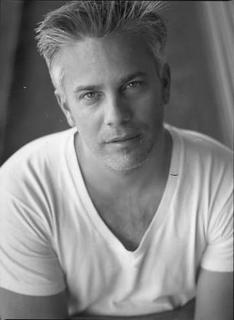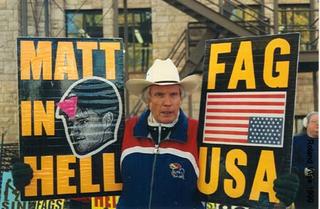AN INTERVIEW WITH ROLAND WISE
 Wandering Angel: Roland Wise’s Seven Year Ache
Wandering Angel: Roland Wise’s Seven Year AcheBy Kimberly Nichols
If you look at the winding history of photographer/writer Roland Wise’s life, you might say it was fate that made him an angel. He was living in Kansas City when Matthew Shepard was killed, a murder that rocked the world and put vulnerability back into the hearts of many gays and lesbians. Roland had come to stay with his sister while regrouping after a stint in Denver and was seriously pondering his life.
“The same week Matt died, I was scheduled to vacation in DC,” he says. “I ended up attending the DC vigil where many folks, including Ellen Degeneres, showed up to speak. I was so upset that I vowed I would go back to Kansas City and create bumper stickers that said DON’T FORGET MATT SHEPARD. I had ten grand in the bank and thought I would see how many stickers that would buy.” But when he returned to KC, his plans were derailed by news that a friend in Denver had died in a ski accident, so off he went to the funeral, putting a temporary stop to his plans. This would become one of those side trips that forever change one's life. “After the funeral I was in my car in a park writing in my journal, and crying about my friend’s death when I looked up and there stood a guy in camouflage with a gun,” Roland recalls. “He was screaming ‘Die Faggot Die’ to the guy in the car ahead of me. I thought it was a joke at first, like when your mom says don’t even point a fake gun at your brother.” But then the gunman began shooting and Roland ducked down into his seat, trying to turn on his car to get the hell out of there. Suddenly, something inside told him to face this man rather than lie down and die. So he sat up, saw the man get into his own car, and slammed on the gas heading right into the man’s vehicle at 30 mph. “His car spun around and faced me,” says Roland. “He had this look of ‘what the fuck are you doing?’ which was strange to me in that he had just shot a man. Nevertheless, his car was able to move so I embarked on a 50-block chase across the park grass through traffic lights until he crashed again across town. At that scene everyone saw me pull up and thought I was the bad guy. He then took off on foot and I followed in my car until he went into a bar. Five minutes later when the police came and I was able to say what happened from the park all the way across town, they went into the bar and arrested him bringing him out for me to ID. This guy told friends the night before he was going into Denver to show the world how to really kill some fags.” The heroic experience threw Roland into the spotlight and while he was spinning in that limelight, he realized that he wanted to stay in Denver and do his part for the growing Matthew Shepard movement. After chasing down a madman, it somehow seemed like a cakewalk to quit his job, leave KS and follow his dreams of being a writer even if he had no idea what that would mean. Thus began his seven year ache.
…………
During his earlier years as a psyche ward night shift counselor Roland would take winter sojourns to write and take photos of the South. One series was called “One More Southern Boy Escapes.” And he means this. His childhood in Florida was the antithesis of what his life is like now. “It was beauty in ruins, the decaying south,” he explains about the photos. “I found myself missing that and knowing that once I fully came out as a gay man, it may never see it again.”
He was anticipating great rejection. He read novels for comfort and avoided the useless encounters with his parents.
“Growing up, y parents were at war with one another and my mother’s only means of controlling how bad it got physically was my father’s obligation to hide his rage in public especially when it came to saving face in our church. I remember when I went to our pastor once to tell of abuse from my father, he totally took my father’s side attributing the wrath I received to my own rebellion. He was wrong to do that but dead on when it came to me being a rebel. I was kicked out of the first Christian school in ninth grade for stealing a car. The reason I took the car is because my sister left it running in the church parking lot and left me in the car.”
Well past the statute of limitations, after years of counseling and the letting go of the desire to sue my parents and the Baptist church/school where I received my earliest education, I was able to look on this time in a very different way,” he describes. “This education was known in the Baptist circles as the Accelerated Christian Education (ACE). Just after de-segregation and the sexual sixties the right wing conservative Christians conveniently (out of fear that their little lambs of God would go astray and intermingle not only with worldly things such as drugs and sex, but with races other than there own) created ACE as a checkpoint Charlie. My take on it now, after working through the lovely things I missed, such as any knowledge of Shakespeare (until the University of Texas years later) is that my time there was much like what I imagine a monk goes through while at monastery. I used to get my day’s work done in about an hour and sit and draw all day, so once I stumbled upon this metaphor of Baptist creating (out of fear) vast amounts of creative time where their little lambs of God were actually racking up meditation hours leaning us all more toward the Buddhist faith, the irony delighted me so that I was able to move on and thank them as well as my parents. “ With that said, he admits he wouldn’t trade any of it if he could. “These are the things that shape us,” he says. “I believe that my parents and I, and my lovely Sister Mary Ann all had an appointment, that we had roles to play and that we each fucking nailed it.”
He earned his Bachelors degree from the University in Texas in order to not only blame, but to beat everyone over the head with a demand for change. “Desiring change and demanding it are two different things,” he says. “In many ways those were what I call the anti-writer years, a time when I was dredging the river bottoms of my life for answers, almost like a detective trying to solve his own murder, perhaps because ones own murder hits the closest to ones home.”
Roland looks you dead straight in the eyes when he speaks, letting roll a lazy Southern drawl, while he calmly and measurably tells you how it is. Every once in a while he’ll crack a one sided smile, and his piercing blue eyes will dance momentarily before shifting right back in to pensive mode.
He moved to Dallas in the mid-eighties. “I was exhausting myself trying to be straight,” he sighs. “I was finally kicked out of seminary a short time later for having a gay experience the evening of my first sermon. I went my own way in shame. It was during this time in my life that I had sort of the hybrid gay life, still Christian, still exploring the gay side privately.”
He finally left and never looked back.
…………….
So when he ended up in Denver, reeling from his heroic experience, he decided to stay.
“I was eavesdropping at my favorite coffee house where Romaine Patterson was working and sharing with someone about the clippings scrapbook she was preparing for Judy Shepard,” he explains. “I interrupted them and asked if I could please donate all the articles and things I had saved to go into this book. She said that would be great, then said ‘hey, you are the town hero, the guy who caught the gunman in the park’.”
 Romaine asked him to be an angel and invited him to a meeting that night with the four others. Together, they ended up designing costumes and preparing for their infamous protest to block hatemonger Fred Phelps at the upcoming Matthew Shepard murder trials. “The contrast of that day simply put was that my entire life had usually involved Baptists like Phelps, who were against everything. As a boy I had marched with my mother and our church against abortion, homosexuality and ERA. For the first time I was on the other side of the fence, and even though we had our backs to Phelps and the gang, it was powerful to finally be my own man.”
Romaine asked him to be an angel and invited him to a meeting that night with the four others. Together, they ended up designing costumes and preparing for their infamous protest to block hatemonger Fred Phelps at the upcoming Matthew Shepard murder trials. “The contrast of that day simply put was that my entire life had usually involved Baptists like Phelps, who were against everything. As a boy I had marched with my mother and our church against abortion, homosexuality and ERA. For the first time I was on the other side of the fence, and even though we had our backs to Phelps and the gang, it was powerful to finally be my own man.”SIDEBAR:
On February 26, 2005 Roland will present his show “Seven Year Ache” at Peppertree Bookstore in Palm Springs. The show includes photographs from his time as an angel. He will also read from and sign copies of his accompanying book of essays. A portion of the proceeds from photography and book sales will be donated to the Matthew Shepard Foundation.
 “We are now in the seventh year since Matt died,” says Roland. “My experience through this time was transformational and I wish to share that with the world.”
“We are now in the seventh year since Matt died,” says Roland. “My experience through this time was transformational and I wish to share that with the world.”NOTE:
Originally published in BottomLine Magazine, ISSUE 24.12 Copyright 2005
For more information, please visit www.PSbottomline.com

